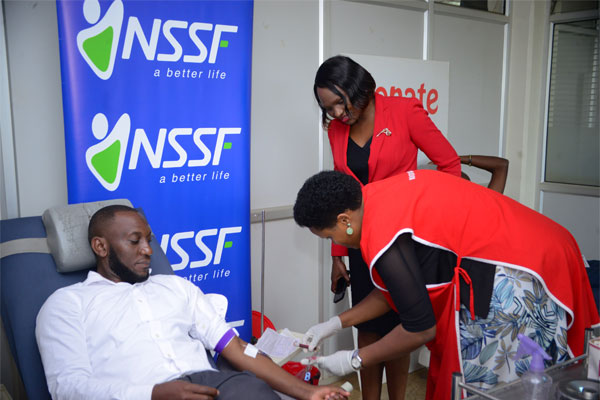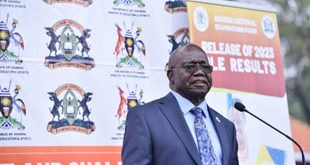
Kampala, Uganda | THE INDEPENDENT | The Uganda Blood Transfusion Services (UBTS) has teamed up with the National Social Security Fund (NSSF) to address the shortage of rare blood groups, specifically the Rhesus-negative blood types, in the blood bank. The three-day drive aims to collect up to 3,000 units of this type of blood, with a particular focus on the “O-negative” blood group, which is considered a universal donor.
The World Health Organization recommends collecting a minimum of 450,000 units of blood annually, but UBTS reports that the highest they have achieved is 320,000 units, which falls short of the country’s requirements. The demand for Rhesus-negative blood types is increasing, and there is an urgent need to collect and stockpile them.
Juliet Adong, the UBTS principal assistant secretary for administration, emphasizes that the Rhesus negative blood group is rare but in high demand. The collaboration with NSSF, which had been interrupted by the COVID-19 pandemic has resumed at a critical time when the need for Rh-negative blood has risen.
William Mugisha, the principal blood donor coordinator at UBTS, states that they will use this opportunity to create a database of Rh-negative blood donors and update existing ones from the region. While they have initially focused on specific areas, they plan to expand their efforts to other parts of the country.
“We are focusing on these blood groups, because they are rare, and we are opening a special day’s base for this group, such that any time we need that blood we call upon you, and we must guard it jealously because if it is not there a lot of lives are lost,” he said.
He adds that the O-ve is only one percent of the current Ugandan donor population, yet it is this type that can donate to everyone irrespective of their group .“Why should we be being risk when we know that any time there can be a need? We want to build good stocks of O-ve, we want to expand our donor base of O-ve, such that tomorrow we are not caught unaware.”
Ambrose Mugume, a senior blood donor recruiter, highlights the surge in demand for Rhesus-negative blood, particularly for surgeries. The limited availability of O-negative blood, which is a universal donor type, has posed challenges, with supplies often being depleted quickly.
“Of late we have realized a spike in the need for Rhesus-negative blood, most likely due to the increase in the number of surgeries. Initially, we did not have anything in place to take care of O-ve people, we only would reserve some in our refrigerators, but we reached a point where there was no way we would reserve anything because anytime an O-ve would appear, it would be taken immediately and we could remain without any reserves. Like we are speaking now we may not be having any reserves for this type.” he said.
Adding that, “It is this that has pushed us to realize that we need to have an O-ve donor database in place because currently, we are not able to reserve it yet initially we would have 5 to 10 units for those emergencies, but as we speak, we have failed to reserve any. So we need a group of people we can rely on at any time of need, even if we reach them at night they can respond.
Barbra Arimi, the head of marketing and corporate affairs at NSSF, explains that such partnerships are part of their corporate social responsibility. Over the past ten years, they have collected over 62,288 units of blood, saving an estimated 187,164 lives. NSSF has also provided support to the UBTS by donating equipment such as a preservation centrifuge and refrigerators for blood storage.
*****
URN
 The Independent Uganda: You get the Truth we Pay the Price
The Independent Uganda: You get the Truth we Pay the Price


